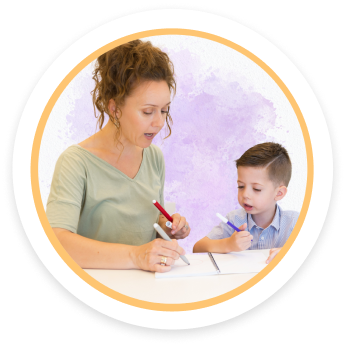Language
- My friend told me that my son should be speaking in full sentences by now, is that true?
NO!
As long as your child understands language, follows verbal commands, and can respond non-verbally or in sounds, they are receptive to language. Articulation develops at different rates and can emerge bit by bit or, more likely, in spurts — just like physical growth spurts!
Children can speak very little and then explode in language, stringing many words together all of a sudden during their early childhood education. Many factors affect this progress; such as birth order, social experiences, and exposure to speaking, reading, and song. Parents often want to see a linear growth pattern in their little one’s child development, but all living things do not grow in a proportional fashion. Children are learning and absorbing language from the start, and we are so eager for them to “prove it” by speaking that we ignore the positive signals that they are developing to reach that milestone in many other ways!
*Be aware of your little one’s verbal ability and promote language by speaking to them, singing with them, and reading books to them.
Social
- I take my child on playdates, but they seem to play by themselves. Is something wrong?
NO!
At this age, children primarily engage in “parallel play” — they play side by side with moments of interaction. This is still a very useful way to develop social etiquette. Being around other little ones is satisfying in many ways — children model behavior, inspire creativity, and help other little ones see the world from a different perspective. Playdates are crucial in the early childhood education years to teach little ones how to manage sharing space, toys, and a caregiver’s attention as part of their child development. Please don’t set unreasonable expectations of playdates.
*Keep planning playdates! As long as all the children have a good time and respect others, it is a success. The experience of playdates and group-play sets the foundation for social and well-adjusted children!
Development
- My daughter is behind where my son was at the same age. Should I worry?
NO!
Please never compare children! It is hard as parents when we have experience raising another child. You can’t help but come to expect it to be an identical situation.
Now I want you to imagine your sibling or best friend…are the two of you the same? Do you have the same strengths? Can you imagine yourselves at 3-years-old, and do you think you would develop at exactly the same time? No! Child development happens rapidly in their first 4 years. 85% of brain growth occurs by age 4, which means little ones are making dramatic progress in every way every day. But like a growing tree, branches lengthen at different times. If a child is drawn to the alphabet and language during their early childhood education, they may not be the most active child at that time. That makes sense, as they might be more focused on books or puzzles and devoting time to more stationary activities than climbing and jumping.
Conversely, if your little one’s child development is very physical they constantly have energy to spare, they probably have not had as many sitting hours to absorb the alphabet. Please appreciate where your little one is at any stage, and be assured they will all catch up in their own time. In the meantime, they are gaining valuable experience that will help them master the phase in which they are absorbed.
*Enjoy each early childhood education phase of your little one’s child development and appreciate your little one for the unique and amazing human they are! If you are still worried, speak to your pediatrician to check if they have concerns.
Behavior
- Teachers, babysitters etc. say my child is so well behaved but they are not well behaved at home. Should I worry?
NO!
This is actually a great sign for child development…which is probably not what you want to hear. If your little one is a joy and well behaved with others or at their early childhood education center, it means you are doing a fantastic job! All children (and adults) need a time to unwind, and quite frequently that involves decompressing and experiencing some big feelings.
They let themselves go and feel their feelings deeply around the people they trust and who give them unconditional love. Unfortunately, that often presents itself in tantrums or challenging behavior away from their early childhood education centers. The important thing to do in these situations is to not rise to their emotional level.
Try to lower your energy, voice volume, and pace to allow them to meet you in a calmer place. Whispering during tantrums is a tool to promote listening, even for a few seconds! It is also encouraged to remove yourself as much as is possible and safe while the behavior occurs — tantrums are rarely as enticing without an audience — by providing distance, you are allowing your little one to come to you when they are more ready to communicate in a healthy way.
*Make your little one feel loved and supported by saying “I would love to help you solve this problem when you are ready to talk calmly and help find a solution.” Then stay calm and patient. Emotions frequently roll like waves over all of us and can’t be rushed, especially at this stage in their child development.




